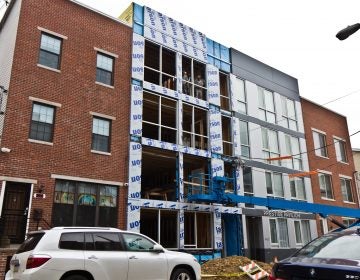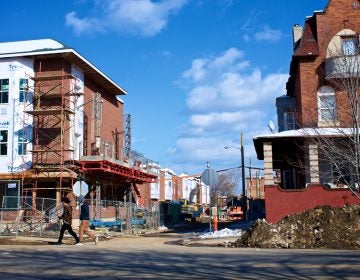Group presses city on overlay bill

June 2
The Development Workshop letter to the city’s legal dept.
By Thomas J. Walsh
For PlanPhilly
In advance of Wednesday’s City Council hearing on the Central Delaware Riverfront Overlay District, approved recently by the Philadelphia City Planning Commission, opponents have appealed to the City Solicitor to draw her attention to what they believe are “fundamental legal defects.”
Hand-delivered to City Solicitor Shelley Smith on May 28, the four-page letter details five such defects and was signed by attorney Michael Sklaroff, on behalf of the Development Workshop, Inc. The Workshop is a nonprofit consortium of “landowners and developers, including those who have been invested in the Central Delaware Riverfront for years,” and other professionals in related fields.
“The purpose of the letter is for the Law Department to make a serious analysis of what represents a radical change in the way that zoning decisions would be made in the city of Philadelphia,” Sklaroff said Tuesday. “This decision, I am sure, will not be made lightly. The letter encourages the Law Department to take an in-depth look at the legislation.”
At the May 19 Planning Commission meeting, Deputy City Solicitor Henry Shwartz testified that the city’s lawyers had studied the overlay legislation, which provides interim zoning guidelines (a “stop-gap measure” lasting up to 16 months) until a permanent plan for the waterfront is adopted.
Wednesday’s hearing will be before Council’s Rules Committee, which must approve it before it goes to the full Council for a vote.
Planner Martin Gregorski, at that May meeting, said the legislation “has been through many amendments.”
The overlay district is in support of the Civic Vision and Action Plan laid out by Penn Praxis over the past two years. It encompasses the area bounded by Allegheny Avenue to the north, east to the Delaware River, Oregon Avenue to the south and Interstate 95 to the west.
The overlay establishes a 100-foot setback for any future development to allow for parks, trails and ecological concerns. It also cites “exigent circumstances” that would exempt certain sites, such as operating industrial areas, from such a setback. The bill mandates public waterfront access points at a width of 12 feet on piers and 25 feet at all other locations.
Commission actions are ‘unlawful’
Sklaroff’s five main points in his letter to Smith were:
(1.) “The Planning Commission is not Authorized under the Philadelphia Home Rule Charter to Make Zoning Decisions.” That is City Council’s job, Sklaroff writes, with administrative help from the Zoning Board of Adjustment and permit issuance from the Department of Licenses and Inspections.
(2.) “Parcel-by-Parcel Zoning Decisions Are Not Lawful.” Fundamental and legal zoning requires a comprehensive plan and uniform standards within districts, the letter states.
(3.) “The Bill would Impose an Unlawful Moratorium.” Citing case law, Sklaroff argues that “stop-gap” or “placeholder” zoning is illegal in Pennsylvania.
(4.) “The Bill Would Create an Unlawful ‘Floating’ Zone in Violation of Comprehensive Building Principles.” The objection here is to what is considered the Planning Commission’s illegal “case-by-case, discretionary review” over individual applications for development in the underlying zoning district.
(5.) “The Bill Would Effect Takings of Private Property Without Just Compensation.” The setbacks outlined in the bill go “way beyond a normal setback for light and air, in scope and intent,” Sklaroff wrote, in part. “The change from as-of-right zoning in commercial districts to a prohibition against any development whatsoever unless the landowner constructs a recreational trail is unlawful on its face and works an unconstitutional exaction.”
Sklaroff, head of Ballard Spahr’s real estate department, is a former member of the Planning Commission’s Advisory Committee on Center City Zoning and served on the Philadelphia Historical Commission for 14 years, six of them as its chair (2002 to 2008).
He and prominent developer Craig Schelter, a former senior executive at the Philadelphia Industrial Development Corp. (and a former City Planning chief), have been the lone voices of dissent (or in some cases, seeking further clarifications) this year at public meetings of the commission and the newly formed Delaware River Waterfront Corp. During public comment periods, they have made the above points more than a few times, but at each meeting have been vastly outnumbered by supporters of the overlay and Penn Praxis plans.
Sklaroff said the Development Workshop has no Web site, and that a list of members requested by PlanPhilly would not be made available at this time. In addition to landowners and developers, the Workshop is said to include “former Philadelphia planning directors and commerce directors; representatives of trade unions; engineering, architectural and other consultants; and members of law firms active in development.”
Sklaroff did not comment on what the group’s plans would be if the overlay legislation makes it out of the Rules Committee intact, or if legal action would be taken should the full Council OK the bill.
The City Solicitor’s office could not be reached for comment by mid-afternoon Tuesday.
Contact the reporter at thomaswalsh1@gmail.com.
WHYY is your source for fact-based, in-depth journalism and information. As a nonprofit organization, we rely on financial support from readers like you. Please give today.






